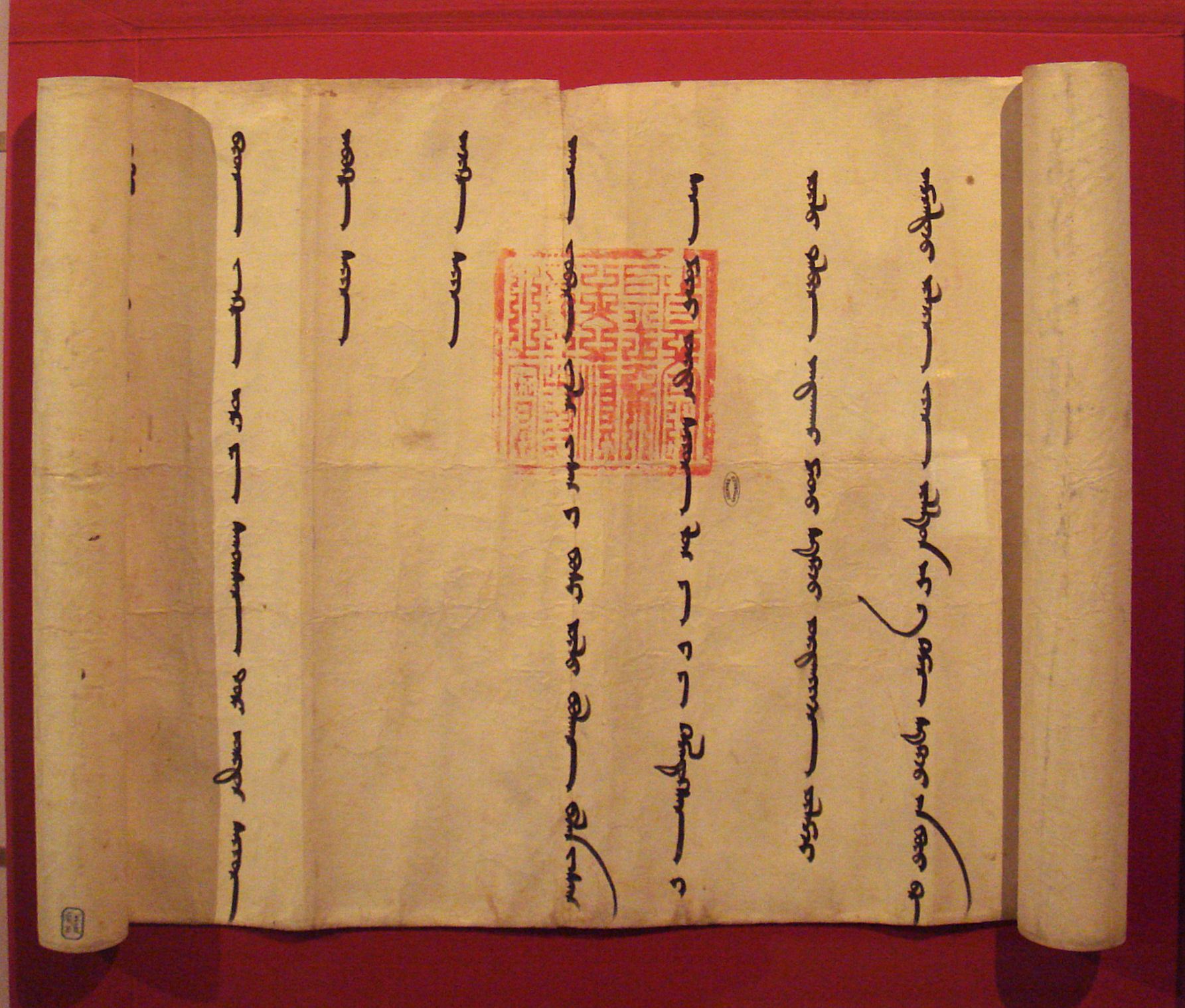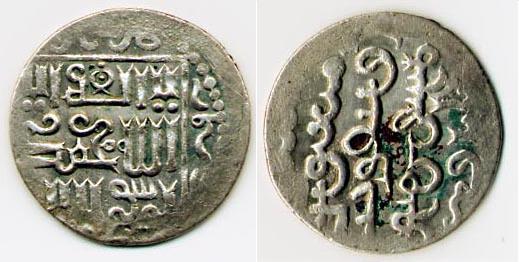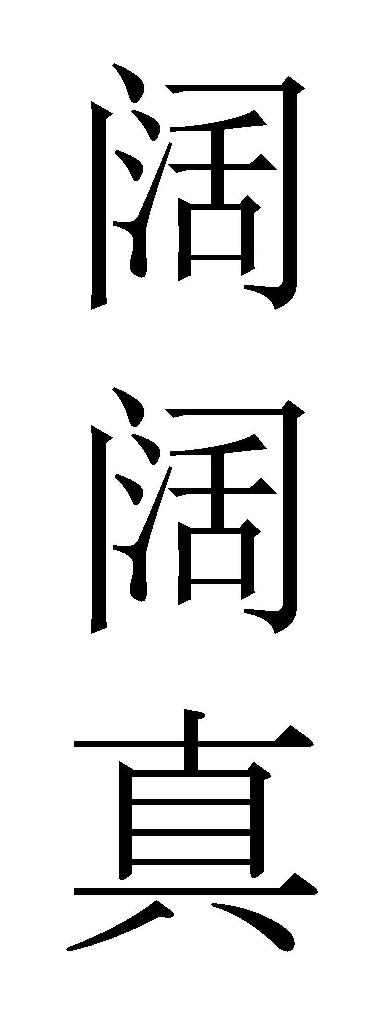|
Ghazan
Mahmud Ghazan (5 November 1271 – 11 May 1304) (, Ghazan Khan, sometimes archaically spelled as Casanus by the Westerners) was the seventh ruler of the Mongol Empire's Ilkhanate division in modern-day Iran from 1295 to 1304. He was the son of Arghun, grandson of Abaqa Khan and great-grandson of Hulagu Khan, continuing a long line of rulers who were direct descendants of Genghis Khan. Considered the most prominent of the Ilkhans, he is perhaps best known for converting to Islam and meeting Imam Ibn Taymiyya in 1295 when he took the throne, marking a turning point for the dominant religion of the Mongols in Western Asia (Iran, Iraq, Anatolia and Transcaucasia). One of his many principal wives was Kököchin, a Mongol princess (originally betrothed to Ghazan's father Arghun before his death) sent by his great-uncle Kublai Khan. Military conflicts during Ghazan's reign included war with the Egyptian Mamluks for control of Syria, and battles with the Turko-Mongol Chagatai K ... [...More Info...] [...Related Items...] OR: [Wikipedia] [Google] [Baidu] |
Franco-Mongol Alliance
Several attempts at a Franco-Mongol alliance against the Islamic caliphates, their common enemy, were made by various leaders among the Frankish Crusaders and the Mongol Empire in the 13th century. Such an alliance might have seemed an obvious choice: the Mongols were already sympathetic to Christianity, given the presence of many influential Nestorian Christians in the Mongol court. The Franks (Western Europeans and those in the Crusader States of the Levant) were open to the idea of support from the East, in part owing to the long-running legend of the mythical Prester John, an Eastern king in an Eastern kingdom who many believed would one day come to the assistance of the Crusaders in the Holy Land.Jackson. ''Mongols and the West''. p. 4. "The failure of Ilkhanid-Western negotiations, and the reasons for it, are of particular importance in view of the widespread belief in the past that they might well have succeeded." The Franks and Mongols also shared a common enemy in the Mu ... [...More Info...] [...Related Items...] OR: [Wikipedia] [Google] [Baidu] |
Baydu
Baydu (Mongolian script:; ) (died 1295) was the sixth ruler of the Mongol empire's Ilkhanate division in Iran. He was the son of Taraqai, who was in turn the fifth son of Hulagu Khan.Stevens, John. ''The history of Persia. Containing, the lives and memorable actions of its kings from the first erecting of that monarchy to this time; an exact Description of all its Dominions; a curious Account of India, China, Tartary, Kermon, Arabia, Nixabur, and the Islands of Ceylon and Timor; as also of all Cities occasionally mention'd, as Schiras, Samarkand, Bokara, &c. Manners and Customs of those People, Persian Worshippers of Fire; Plants, Beasts, Product, and Trade. With many instructive and pleasant digressions, being remarkable Stories or Passages, occasionally occurring, as Strange Burials; Burning of the Dead; Liquors of several Countries; Hunting; Fishing; Practice of Physick; famous Physicians in the East; Actions of Tamerlan, &c. To which is added, an abridgment of the lives of the ki ... [...More Info...] [...Related Items...] OR: [Wikipedia] [Google] [Baidu] |
Nawrūz (Mongol Emir)
Nawrūz (; died 13 August 1297) was a son of governor Arghun Aqa, and was a powerful Oirat emir of the 13th century who played an important role in the politics of the Mongol Ilkhanate. Early career He inherited his father's administrative job in Khorasan and was listed as emir and son-in-law of Abaqa in medieval chroniclers' works. He supported Arghun against Teküder in 1284 and was rewarded by being ''atabeg'' of his 13-year-old son Ghazan and Prince Kingshü (son of Jumghur) as Ghazan's subordinate in Khorasan thanks to the new kingmaker Buqa. He held this powerful position of being the autonomous de facto ruler of Khorasan until Arghun Khan's arrest of Buqa. Rebellion Hearing of the arrival of an Ilkhanate army towards Khorasan, Nawrūz led a revolt against Arghun, possibly proclaiming Hulachu (son of Hulagu) and Kingshü (who seems to have died or been executed sometime during the revolt) as new ilkhan, captured his commander Tegine Yarguchi, and banished his form ... [...More Info...] [...Related Items...] OR: [Wikipedia] [Google] [Baidu] |
Ilkhanate
The Ilkhanate, also spelled Il-khanate ( fa, ایل خانان, ''Ilxānān''), known to the Mongols as ''Hülegü Ulus'' (, ''Qulug-un Ulus''), was a khanate established from the southwestern sector of the Mongol Empire. The Ilkhanid realm, officially known as ''Iranzamin'' (), was ruled by the Mongol House of Hulagu. Hulagu Khan, the son of Tolui and grandson of Genghis Khan, inherited the Middle Eastern part of the Mongol Empire after his brother Möngke Khan died in 1260. Its core territory lies in what is now part of the countries of Iran, Azerbaijan, and Turkey. At its greatest extent, the Ilkhanate also included parts of modern Iraq, Syria, Armenia, Georgia, Afghanistan, Turkmenistan, Pakistan, part of modern Dagestan, and part of modern Tajikistan. Later Ilkhanate rulers, beginning with Ghazan in 1295, converted to Islam. In the 1330s, the Ilkhanate was ravaged by the Black Death. Its last khan Abu Sa'id died in 1335, after which the khanate disintegrated. The ... [...More Info...] [...Related Items...] OR: [Wikipedia] [Google] [Baidu] |
Ibn Taymiyya
Ibn Taymiyyah (January 22, 1263 – September 26, 1328; ar, ابن تيمية), birth name Taqī ad-Dīn ʾAḥmad ibn ʿAbd al-Ḥalīm ibn ʿAbd al-Salām al-Numayrī al-Ḥarrānī ( ar, تقي الدين أحمد بن عبد الحليم بن عبد السلام النميري الحراني ),Ibn Taymiyyah, Taqi al-Din Ahmad, The Oxford Dictionary of Islam. http://www.oxfordreference.com/view/10.1093/acref/9780195125580.001.0001/acref-9780195125580-e-959 was a Sunni Muslim ʿĀlim, muhaddith, judge, proto-Salafist theologian, and sometimes controversial thinker and political figure. He is known for his diplomatic involvement with the Ilkhanid ruler Ghazan Khan and for his involvement at the Battle of Marj al-Saffar which ended the Mongol invasions of the Levant. A member of the Hanbali school, Ibn Taymiyyah's iconoclastic views that condemned numerous folk practices associated with saint veneration and the visitation of tomb-shrines made him unpopular with many s ... [...More Info...] [...Related Items...] OR: [Wikipedia] [Google] [Baidu] |
Ilkhan
The Ilkhanate, also spelled Il-khanate ( fa, ایل خانان, ''Ilxānān''), known to the Mongols as ''Hülegü Ulus'' (, ''Qulug-un Ulus''), was a khanate established from the southwestern sector of the Mongol Empire. The Ilkhanid realm, officially known as ''Iranzamin'' (), was ruled by the Mongol House of Hulagu. Hulagu Khan, the son of Tolui and grandson of Genghis Khan, inherited the Middle Eastern part of the Mongol Empire after his brother Möngke Khan died in 1260. Its core territory lies in what is now part of the countries of Iran, Azerbaijan, and Turkey. At its greatest extent, the Ilkhanate also included parts of modern Iraq, Syria, Armenia, Georgia, Afghanistan, Turkmenistan, Pakistan, part of modern Dagestan, and part of modern Tajikistan. Later Ilkhanate rulers, beginning with Ghazan in 1295, converted to Islam. In the 1330s, the Ilkhanate was ravaged by the Black Death. Its last khan Abu Sa'id died in 1335, after which the khanate disintegrated. The Ilkhan ... [...More Info...] [...Related Items...] OR: [Wikipedia] [Google] [Baidu] |
Arghun
Arghun Khan (Mongolian Cyrillic: ''Аргун хан''; Traditional Mongolian: ; c. 1258 – 10 March 1291) was the fourth ruler of the Mongol empire's Ilkhanate, from 1284 to 1291. He was the son of Abaqa Khan, and like his father, was a devout Buddhist (although pro-Christian). He was known for sending several embassies to Europe in an unsuccessful attempt to form a Franco–Mongol alliance against the Muslims in the Holy Land. It was also Arghun who requested a new bride from his great-uncle Kublai Khan. The mission to escort the young Kököchin across Asia to Arghun was reportedly taken by Marco Polo. Arghun died before Kököchin arrived, so she instead married Arghun's son, Ghazan. Early life Arghun was born to Abaqa Khan and his Öngüd, possibly Christian concubine Qaitmish egechi in 8 March 1259 (although Rashid al-Din states it was in 1262, which is unlikely) near Baylaqan. He grew up in Khorasan under care of Sartaq Noyan (from Jalair tribe) who was his milit ... [...More Info...] [...Related Items...] OR: [Wikipedia] [Google] [Baidu] |
Mongol Empire
The Mongol Empire of the 13th and 14th centuries was the largest contiguous land empire in history. Originating in present-day Mongolia in East Asia, the Mongol Empire at its height stretched from the Sea of Japan to parts of Eastern Europe, extending northward into parts of the Arctic; eastward and southward into parts of the Indian subcontinent, attempted invasions of Southeast Asia and conquered the Iranian Plateau; and westward as far as the Levant and the Carpathian Mountains. The Mongol Empire emerged from the unification of several nomadic tribes in the Mongol homeland under the leadership of Temüjin, known by the more famous title of Genghis Khan (–1227), whom a council proclaimed as the ruler of all Mongols in 1206. The empire grew rapidly under his rule and that of his descendants, who sent out invading armies in every direction. The vast transcontinental empire connected the East with the West, and the Pacific to the Mediterranean, in an enforced '' Pax M ... [...More Info...] [...Related Items...] OR: [Wikipedia] [Google] [Baidu] |
Kököchin
Kököchin, also Kökejin, Kūkājīn, Cocacin or Cozotine ( Mn: , Ch: ), was a 13th-century princess of the Mongol-led Chinese Yuan dynasty, belonging to the Mongol Bayaut tribe. In 1291, she was betrothed to the Ilkhanate khan Arghun by the Yuan founding emperor Kublai, but married his son Ghazan when Arghun died by the time she had arrived in Persia in 1293. The account of Kököchin's journey to Persia was given by Marco Polo. Name Note that among the various English translations of Polo's book, there are at least ten spellings for her name. Absent various accented characters here, the names include Cocachin, Cocacin, Cozotine, Kogatin, Kokachin, Kokechin, Kokejin, Kokochin, Kukachin, and Kukajin. "Kökö" may mean "blue" (especially "sky blue", cf. *kȫk) or "dark" as in complexion, and "chin" or "jin" a suffix used for the name of a person. The name "Kököchin" may therefore be translated as "The Dark Complected". The name could also be a corruption of kȫker ... [...More Info...] [...Related Items...] OR: [Wikipedia] [Google] [Baidu] |
Islam
Islam (; ar, ۘالِإسلَام, , ) is an Abrahamic monotheistic religion centred primarily around the Quran, a religious text considered by Muslims to be the direct word of God (or '' Allah'') as it was revealed to Muhammad, the main and final Islamic prophet.Peters, F. E. 2009. "Allāh." In , edited by J. L. Esposito. Oxford: Oxford University Press. . (See alsoquick reference) " e Muslims' understanding of Allāh is based...on the Qurʿān's public witness. Allāh is Unique, the Creator, Sovereign, and Judge of mankind. It is Allāh who directs the universe through his direct action on nature and who has guided human history through his prophets, Abraham, with whom he made his covenant, Moses/Moosa, Jesus/Eesa, and Muḥammad, through all of whom he founded his chosen communities, the 'Peoples of the Book.'" It is the world's second-largest religion behind Christianity, with its followers ranging between 1-1.8 billion globally, or around a quarter of the world's ... [...More Info...] [...Related Items...] OR: [Wikipedia] [Google] [Baidu] |
Hulagu Khan
Hulagu Khan, also known as Hülegü or Hulegu ( mn, Хүлэгү/ , lit=Surplus, translit=Hu’legu’/Qülegü; chg, ; Arabic: fa, هولاکو خان, ''Holâku Khân;'' ; 8 February 1265), was a Mongol ruler who conquered much of Western Asia. Son of Tolui and the Keraite princess Sorghaghtani Beki, he was a grandson of Genghis Khan and brother of Ariq Böke, Möngke Khan, and Kublai Khan. Hulagu's army greatly expanded the southwestern portion of the Mongol Empire, founding the Ilkhanate of Persia, a precursor to the eventual Safavid dynasty, and then the modern state of Iran. Under Hulagu's leadership, the siege of Baghdad (1258) destroyed Baghdad's standing in the Islamic Golden Age and weakened Damascus, causing a shift of Islamic influence to the Mamluk Sultanate in Cairo and ended the Abbasid Dynasty. Background Hulagu was born to Tolui, one of Genghis Khan's sons, and Sorghaghtani Beki, an influential Keraite princess and a niece of Tog ... [...More Info...] [...Related Items...] OR: [Wikipedia] [Google] [Baidu] |
Abaqa Khan
Abaqa Khan (27 February 1234 – 4 April 1282, mn, Абаха/Абага хан (Khalkha Cyrillic), ( Traditional script), "paternal uncle", also transliterated Abaġa), was the second Mongol ruler (''Ilkhan'') of the Ilkhanate. The son of Hulagu Khan and Lady Yesünčin and the grandson of Tolui, he reigned from 1265 to 1282 and was succeeded by his brother Ahmed Tekuder. Much of Abaqa's reign was consumed with civil wars in the Mongol Empire, such as those between the Ilkhanate and the northern khanate of the Golden Horde. Abaqa also engaged in unsuccessful attempts at invading Syria, which included the Second Battle of Homs. Life Abaqa was born in Mongolia on 27 February 1234, son of Ilkhanate founder Hulagu Khan. Abaqa was a Buddhist. A favoured son of Hulagu, he was made governor of Turkestan.Runciman, p. 320. Hulagu died from illness in 1265. Before his death, he had been negotiating with the Byzantine Emperor Michael VIII Palaiologos to add a daughter of the Byzant ... [...More Info...] [...Related Items...] OR: [Wikipedia] [Google] [Baidu] |








.jpg)
.jpeg/1200px-Prise_d'Alamût_(1256).jpeg)
